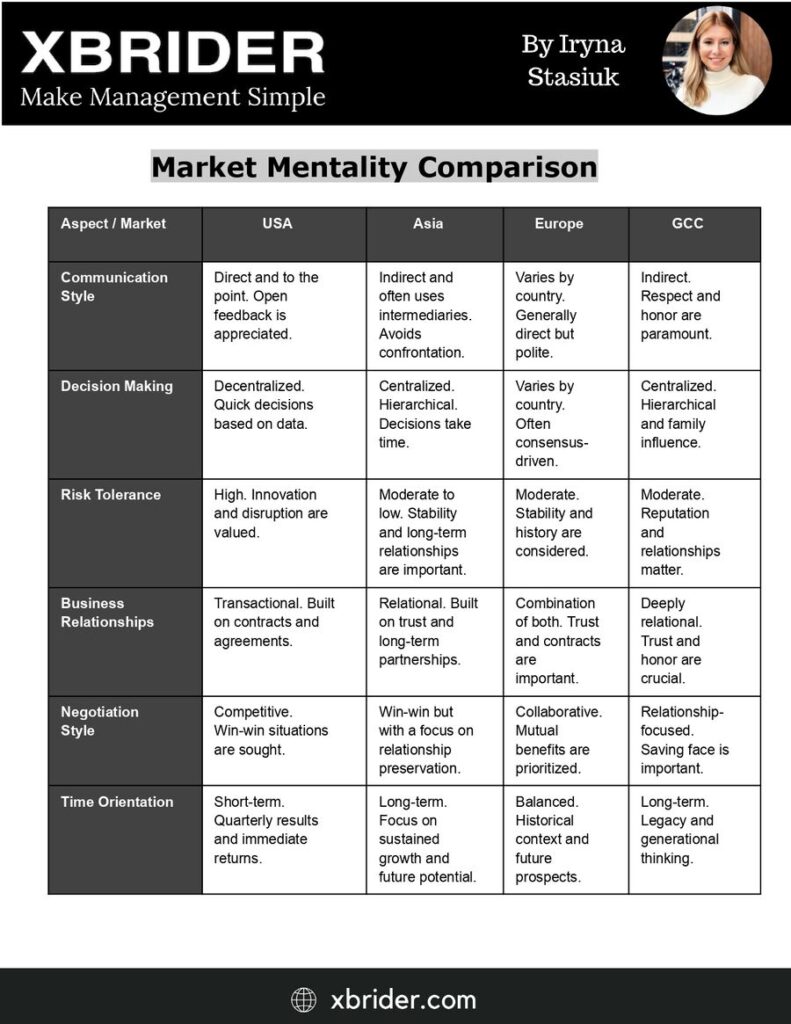Business Mentality Across Key Global Markets
In today’s interconnected world, businesses are no longer confined to their local markets. The age of globalization has opened up opportunities for companies to expand their reach across continents. However, with these opportunities come challenges, especially when it comes to understanding and adapting to different business mentalities. In this article, we’ll delve deeper into the business mentalities of four major regions: the USA, Asia, Europe, and the Arab world.

A Deep Dive into USA, Asia, Europe, and Arab Regions
1. USA Markets: The Land of Opportunity
The United States, often referred to as the land of opportunity, has a business culture that reflects its pioneering spirit. Here, innovation is celebrated, risks are often embraced, and the entrepreneurial spirit is deeply ingrained.
Communication: American business culture values directness. Whether it’s a board meeting or a casual business lunch, people are expected to speak their minds, albeit respectfully. This directness is seen as a way to expedite processes and arrive at decisions more swiftly.
Decision Making: The US market is known for its decentralized decision-making processes. Middle managers and even entry-level employees might have more decision-making power than their counterparts in other parts of the world. This approach fosters innovation as it allows a multitude of perspectives to influence the business.
Risk Tolerance: The US’s history is filled with stories of entrepreneurs who took significant risks. This risk-taking mentality is still prevalent. Companies are often encouraged to innovate, disrupt, and break the mold, even if it means potential failure.
Relationships: While relationships are essential, the American business culture is primarily transactional. Contracts, agreements, and clarity of terms take precedence.
2. Asia: The Dragon and the Tiger
Asia, with its diverse cultures, languages, and histories, offers a unique blend of traditional values and rapid modernization. The business culture here is as varied as its geography, but some common threads run through.
Communication: Many Asian cultures value harmony and avoid direct confrontation. This means that saying “no” directly might be considered rude. Instead, indirect ways of expressing disagreement or refusal are preferred.
Decision Making: Hierarchical structures are prevalent in many Asian businesses. Decisions often come from the top, and there’s a deep respect for seniority. This respect for hierarchy can sometimes slow down decision-making processes, but it ensures that decisions are made with a lot of deliberation.
Risk Tolerance: Stability and long-term growth are preferred over quick wins. This mentality is reflected in the way Asian companies plan their strategies, often looking at the long-term picture.
Relationships: Business in Asia is built on relationships. The concept of “Guanxi” in China, which emphasizes the importance of networks and connections, is a testament to this. Trust is paramount, and business deals are often sealed with a handshake.
3. Europe: The Old World Charm
Europe, with its rich history and diverse cultures, offers a blend of traditional values and modern business practices.
Communication: European businesspeople are generally direct but polite. There’s an emphasis on clarity, but not at the expense of courtesy.
Decision Making: Consensus is vital. Decisions, especially significant ones, are often made collectively, with inputs from various stakeholders.
Risk Tolerance: Europeans tend to be risk-averse, especially when compared to their American counterparts. There’s a preference for stability and proven methods over disruption.
Relationships: Trust plays a crucial role in European business culture. While contracts are essential, a person’s word and handshake carry significant weight.
4. GCC World: Where Tradition Meets Business
The Arab world, rich in history and tradition, offers a unique business culture.
Communication: Respect is paramount. Direct confrontation is avoided, and there’s an emphasis on preserving one’s honor and dignity.
Decision Making: Family businesses are prevalent in the Arab world, leading to centralized decision-making processes. Family reputation and honor play a significant role in business decisions.
Risk Tolerance: The Arab business culture is moderate when it comes to risk. While there’s an openness to new opportunities, there’s also a deep respect for tradition and proven methods.
Relationships: Trust is the cornerstone of Arab business culture. Relationships are nurtured over time, and once established, they’re for life.
Understanding these business mentalities is crucial for any company looking to expand globally. While this article provides a broad overview, it’s essential to remember that each country within these regions will have its nuances. As the world becomes more interconnected, the ability to understand, respect, and adapt to different business cultures will be the key to global success.


